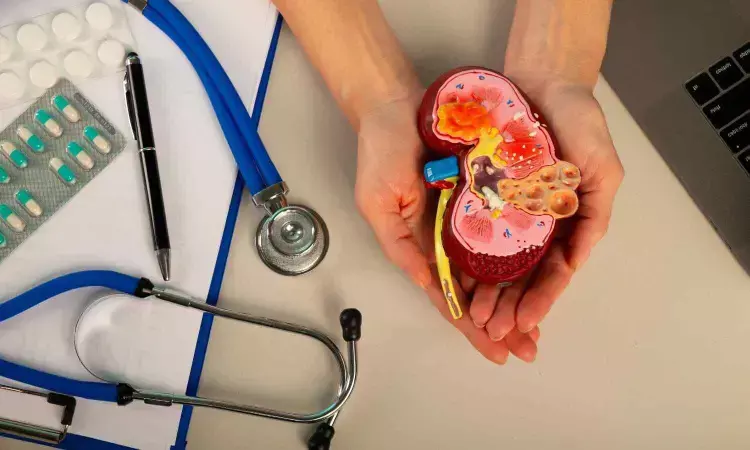- Home
- Medical news & Guidelines
- Anesthesiology
- Cardiology and CTVS
- Critical Care
- Dentistry
- Dermatology
- Diabetes and Endocrinology
- ENT
- Gastroenterology
- Medicine
- Nephrology
- Neurology
- Obstretics-Gynaecology
- Oncology
- Ophthalmology
- Orthopaedics
- Pediatrics-Neonatology
- Psychiatry
- Pulmonology
- Radiology
- Surgery
- Urology
- Laboratory Medicine
- Diet
- Nursing
- Paramedical
- Physiotherapy
- Health news
- Fact Check
- Bone Health Fact Check
- Brain Health Fact Check
- Cancer Related Fact Check
- Child Care Fact Check
- Dental and oral health fact check
- Diabetes and metabolic health fact check
- Diet and Nutrition Fact Check
- Eye and ENT Care Fact Check
- Fitness fact check
- Gut health fact check
- Heart health fact check
- Kidney health fact check
- Medical education fact check
- Men's health fact check
- Respiratory fact check
- Skin and hair care fact check
- Vaccine and Immunization fact check
- Women's health fact check
- AYUSH
- State News
- Andaman and Nicobar Islands
- Andhra Pradesh
- Arunachal Pradesh
- Assam
- Bihar
- Chandigarh
- Chattisgarh
- Dadra and Nagar Haveli
- Daman and Diu
- Delhi
- Goa
- Gujarat
- Haryana
- Himachal Pradesh
- Jammu & Kashmir
- Jharkhand
- Karnataka
- Kerala
- Ladakh
- Lakshadweep
- Madhya Pradesh
- Maharashtra
- Manipur
- Meghalaya
- Mizoram
- Nagaland
- Odisha
- Puducherry
- Punjab
- Rajasthan
- Sikkim
- Tamil Nadu
- Telangana
- Tripura
- Uttar Pradesh
- Uttrakhand
- West Bengal
- Medical Education
- Industry
Hemodiafiltration reduces all-cause mortality in people with kidney failure: Lancet

A new study published in The Lancet journal showed that hemodiafiltration lowers mortality associated with kidney failure compared to hemodialysis, with dose-dependent advantages. Within 5 years of the first dialysis demand, kidney failure is linked to a death risk of almost 50%. Estimates of survival may increase with convection-based hemodialysis therapies, which eliminate a wider range of uremic chemicals than diffusive therapy.
According to randomized clinical research, individuals with kidney failure who get high-dose hemodiafiltration instead of traditional high-flux hemodialysis have a 23% decreased chance of dying. However, it is yet unknown if treatment effects vary among subgroups, if there is a dose-response connection with convection volume, and how it affects cause-specific mortality.
Thus, Robin Vernooij and colleagues presented an overview of the available data from randomized controlled studies comparing hemodiafiltration and hemodialysis that were intended to evaluate all-cause mortality in patients with renal failure is the goal of this individual patient data meta-analysis. This study wanted to offer more exact estimates of the impact of hemodiafiltration vs hemodialysis across multiple subgroups, to measure cause-specific mortality, and to provide light on the ongoing link between attained convection volume and mortality risks.
This research looked for randomized controlled trials that compared online hemodialysis vs hemodiafiltration intended to quantify mortality outcomes in Embase, MEDLINE, and the Cochrane Central Register of Controlled Trials published since the creation of database on July 17, 2024. All-cause mortality was the main result. Cox proportional hazards regression models were used to estimate hazard ratios and 95% confidence intervals.
This analysis included 5 studies with a total of 4153 patients (2070 undergoing hemodialysis and 2083 receiving hemodiafiltration). When compared to 559 patients (27·0%) treated with hemodialysis, 477 patients (23·3%) had all-cause death after a median follow-up of 30 months (IQR 24–36) (hazard ratio 0·84 [95% CI 0·74–0·95]).
Also, there was no indication of a difference in impact between subgroups. It was evident that the convection volume and mortality risk had a graded relationship, with the mortality risk decreasing as the volume grew. Overall, online hemodiafiltration lowers all-cause mortality in patients with renal failure when compared to hemodialysis.
Source:
Vernooij, R. W. M., Hockham, C., Strippoli, G., Green, S., Hegbrant, J., Davenport, A., Barth, C., Canaud, B., Woodward, M., Blankestijn, P. J., Bots, M. L., Blankestijn, P. J., Vernooij, R. W., Hockham, C., Strippoli, G. F., Canaud, B., Hegbrant, J., Barth, C., Cromm, K., … Woodward, M. (2024). Haemodiafiltration versus haemodialysis for kidney failure: an individual patient data meta-analysis of randomised controlled trials. In The Lancet (Vol. 404, Issue 10464, pp. 1742–1749). Elsevier BV. https://doi.org/10.1016/s0140-6736(24)01859-2
Neuroscience Masters graduate
Jacinthlyn Sylvia, a Neuroscience Master's graduate from Chennai has worked extensively in deciphering the neurobiology of cognition and motor control in aging. She also has spread-out exposure to Neurosurgery from her Bachelor’s. She is currently involved in active Neuro-Oncology research. She is an upcoming neuroscientist with a fiery passion for writing. Her news cover at Medical Dialogues feature recent discoveries and updates from the healthcare and biomedical research fields. She can be reached at editorial@medicaldialogues.in
Dr Kamal Kant Kohli-MBBS, DTCD- a chest specialist with more than 30 years of practice and a flair for writing clinical articles, Dr Kamal Kant Kohli joined Medical Dialogues as a Chief Editor of Medical News. Besides writing articles, as an editor, he proofreads and verifies all the medical content published on Medical Dialogues including those coming from journals, studies,medical conferences,guidelines etc. Email: drkohli@medicaldialogues.in. Contact no. 011-43720751


